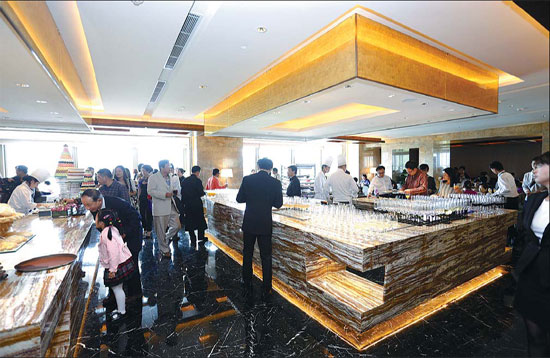Discovering a recipe for success
 0 Comment(s)
0 Comment(s) Print
Print E-mail China Daily, August 12, 2013
E-mail China Daily, August 12, 2013
|
A buffet in the WH Min Hotel in Shanghai. The five-star and 188-room hotel is a new venture by cuisine company Xiao Nan Guo Group Holdings Ltd. [China Daily] |
Transforming Xiao Nan Guo from a China-based restaurant chain into a global dining, hospitality and entertainment group has been Wang Huimin's dream for two decades.
Her dream finally came true when the five-star and 188-room WH Min Hotel, named after the pinyin abbreviation of Wang's full name, was launched in October 2012 in Shanghai.
"I am keen to create a homegrown luxury hospitality experience to receive our customers," said 56-year-old Wang, chairwoman of Xiao Nan Guo Group Holdings Ltd.
A big selling point of the WH Min experience is the "one night, two meals" deal, which emerged in Asia during the 1990s, and encompasses a delicious dinner, revitalizing sleep and an exceptional breakfast.
"We would like to take advantage of our delicate dishes prepared by professional chefs to enable hotel guests to enjoy their food during their stay here," said Wang, adding that the opening of the hotel was the culmination of the group's ambition to combine dining and leisure activities and offer a more relaxing and personalized service to middle- and upper-class customers.
Wang quit her job at a State-owned enterprise and opened the first Xiao Nan Guo restaurant in 1987, despite strong family opposition. It meant sacrificing a position that offered a stable salary and a guaranteed pension.
Wang's grandparents had been in business so she was not exactly a novice. Furthermore, her family loved cooking, nurturing in her a good sense of tasty and nutritious food.
The then 30-year-old used her saving to open the first Xiao Nan Guo restaurant, with only a few tables. It was located on Changsha Road, a street full of hardware shops in Shanghai's Huangpu district, and provided authentic Shanghai cuisine.
There were few private restaurants in Shanghai in the 1980s. Wang insisted on high quality dishes and warm service. As word spread, her restaurant attracted many emerging wealthy customers from all over Shanghai.
Soon the venue was too small to meet demand so Wang opened a second outlet in 1995 at a cost of 1 million yuan ($160,600).
The second Xiao Nan Guo, with more than 100 sq m, was located in Huanghe Street, a hub of high-end and competitive eateries. Both Wang and Xiao Nan Guo started to grow in terms of business operations and market competition skills.
While others strove to get a bigger share of the market in the street, Wang started to look for new opportunities. She decided to open a chain near Shanghai Hongqiao International Airport.
Her new 1,000-plus sq m restaurant soon became an essential diner for business travelers to Shanghai after its launch in 1997. They could taste authentic local food, enjoy a decent environment while being close to a major transport hub.
Wang's boldest investment on the mainland was 100 million yuan in 2000 when she bought a 1.3 hectare property to build a flagship restaurant with the capacity to seat nearly 1,000 people in a Shanghai suburb. Although some people doubted whether customers could afford to travel so far to enjoy food, the move proved a success.
"My boldness is based on my confidence in the purchasing power of Chinese people," said Wang. "They like nice food and they can now buy cars to travel further afield rather than staying downtown."
The nation's dining industry has maintained double-digit growth over the past 30 years. Revenues topped 2 trillion yuan in 2011. They are expected to reach 3.7 trillion yuan by the end of 2015, according to the Ministry of Commerce.
Xiao Nan Guo is now operating more than 70 restaurants in 10 provinces and the Hong Kong Special Administrative Region. Wang plans to have 100 outlets on the Chinese mainland, Hong Kong and Macao by 2013.
Xiao Nan Guo opened its first Hong Kong chain in 2001. Choosing Hong Kong as the second regional focus of Xiao Nan Guo outside Shanghai, Wang admitted that the move was bold and said that she took the risk of losing money to gain experience.
"I wanted to see a wider view of the world by bringing my restaurant to Hong Kong to learn how to survive in a place with a wide range of food from all over the world," said Wang.
Eleven years later, Wang's decision proved to be wise after Xiao Nan Guo was listed on the Hong Kong Stock Exchange on July 4, 2012, raising HK$512 million ($66.03 million).







Go to Forum >>0 Comment(s)